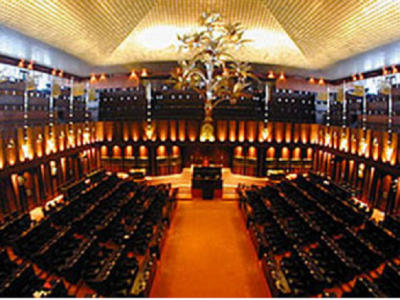(LANKAPUVATH | COLOMBO) – President Gotabaya Rajapaksa yesterday said that international and intra-regional cooperation should be enhanced to rebuild the economy that is collapsing due to the current global crisis and to enrich the people affected by poverty.
The President further said that despite the challenges ahead, the future of BIMSTEC countries is clear and strong. The President made these remarks delivering the Welcome Address and Country Statement for the BIMSTEC Summit via video link from the Presidential Secretariat.
The President said the economic consequences of the pandemic were especially severe on Sri Lanka and the restrictions imposed to curtail the spread of the virus in 2020 and 2021 seriously affected every sector of the economy.
He added that the loss of tourism and remittances from expatriate workers, alongside the cost of healthcare programmes and provision of welfare for those whose livelihoods were affected by pandemic, have combined with rising global inflation and country’s historic debt service obligations to create a challenging economic situation for Sri Lanka. “However, I am confident that together with the remarkable strength and resilience of our people, tried and tested over time, and the cooperation of our regional and international partners, Sri Lanka will prevail over these difficulties and engineer a rapid economic recovery,” he observed.
“The pandemic badly affected all nations. Many countries underwent significant economic, social, and political change. With its ripple effects continuing to impact the global economy, rising oil prices, freight charges, and supply constraints arising from the pandemic are causing inflation around the world”, he remarked.
The President pointed out that alongside the rising Cost of Living, millions have suffered lost livelihoods with the closure of countless businesses, narrowing of economic opportunities, and in some instances, the fall of entire industries. Striving to increase trade and investment activities within the region is important, said the President. “Tourism, which is finally starting to re-emerge after two years of near inactivity, holds great potential for all BIMSTEC nations. Fostering intra-regional tourism should therefore be a pillar in BIMSTEC’s agenda.
“The Bay of Bengal region has become increasingly important for global connectivity and trade. The international shipping lines traversing these waters help keep the engines of the global economy running. It is essential that littoral nations work together to ensure that threats to these waters, as well as to regional States, are curtailed,” President Rajapaksa stressed.
The President explained the need for increased intelligence sharing, and inter-Governmental and inter-agency cooperation amongst BIMSTEC Member Nations and added that the security of the region can be enhanced for the benefit of all nations through this.
Bangladeshi Prime Minister Sheikh Hasina said that all BIMSTEC countries should join hands to work together. Premier Hasina also said that all Member States should join hands to fully implement the organisation’s 14 sectors of cooperation.
Pointing out the need to improve digital connectivity in the region, Prime Minister of Bhutan Dr. Lotay Tshering called for the provision of free or affordable Internet access to the public for online education and other purposes.
Nepali Prime Minister Sher Bahadur Deuba highlighted the need for enhanced cooperation to combat terrorist activities, human trafficking and money laundering.
Myanmar Foreign Minister Wunna Maung Lwin said food security should be given priority in the face of ongoing global challenges.
Thailand is ready to assist the Member States in promoting sustainable and environment-friendly tourism, Thai Prime Minister Prayut Chan-Ocha said.
This year’s Summit was hosted by Sri Lanka and chaired by President Gotabaya Rajapaksa.
The BIMSTEC Senior Officers’ Meeting and the Cabinet Meeting was held on March 28 and 29 at the Bandaranaike Memorial International Conference Hall (BMICH), Colombo, representing Sri Lanka, India, Bangladesh, Bhutan, Nepal, and Thailand.
The Bay of Bengal Initiative for Multi-Sectoral Technical and Economic Cooperation (BIMSTEC) is a regional organization that was established on June 6,1997 with the signing of the Bangkok Declaration. Being a sector-driven grouping, cooperation within BIMSTEC had initially focused on six sectors in 1997 (trade, technology, energy, transport, tourism, and fisheries) and expanded in 2008 to incorporate agriculture, public health, poverty alleviation, counter-terrorism, environment, culture, people-to-people contact, and climate change.
Subsequently, following steps to rationalize and reorganize sectors and sub-sectors, cooperation was reorganized in 2021 under various sectors and sub-sectors led by the respective Member States.
The adoption of the BIMSTEC Charter, signing of several legal agreements and handing over of the Chairmanship of BIMSTEC to Thailand for 2022-2023 also took place during the Summit.
The Colombo Summit was held in a hybrid format, with both physical and virtual components in view of Covid health regulations in Sri Lanka.




